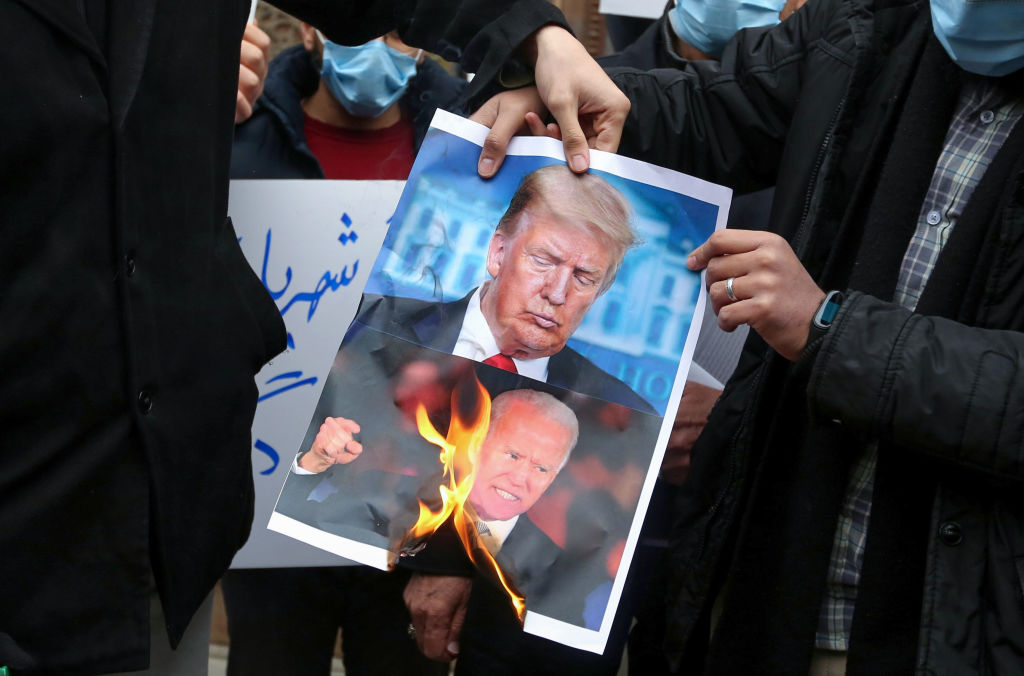Is Trump trigger-happy towards Iran?
Posted By Amin Saikal on November 30, 2020 @ 14:45

The world has entered potentially the most dangerous days of Donald Trump’s presidency. The US president, who has refused to acknowledge his election loss, is in a trigger-happy position to ignite a foreign policy crisis before the end of his tenure on 20 January. The region in which he can act, in conjunction with Israel and Saudi Arabian support, is the Persian Gulf, where a number of events have come together to lead Trump to potentially initiate a US attack on Iran.
The alleged Israeli assassination of Iran’s top nuclear scientist, Mohsen Fakhrizadeh, outside Tehran on Friday comes against the backdrop of several ostensibly linked developments over the past month. As reported by the New York Times [1], shortly after the American networks declared Joe Biden the winner of the November election, Trump asked the Pentagon to identify targets for a military assault on Iran—the country that he has demonised and sanctioned as a regional menace ever since taking office. He was dissuaded by his advisers, but Trump personally did not take it off the table. This was followed by a reportedly secret meeting [2] a week ago between Trump’s like-minded and close friends, Israeli Prime Minister Benjamin Netanyahu and the de facto ruler of Saudi Arabia, Crown Prince Mohammad bin Salman.
Then came the release from an Iranian jail of the Australian academic Kylie Moore-Gilbert after serving two years of a 10-year jail sentence on espionage charges, which she has persistently denied. However, at the same time as her release, three Iranians, who had allegedly plotted to kill Israeli diplomats in Bangkok, were freed from Thai prisons. The Australian government is sure to have played a key role in the exchange, although it has remained quiet about what it may have promised the Thai government for its favour. It has only affirmed Moore-Gilbert’s denial of spying and claimed that no one was released from Australia, although there’s evidently no Iranian person of interest in an Australian jail at present.
Meanwhile, Biden has said that his administration will provide world leadership where required by America’s national security interests. As part of this, he plans to re-engage Tehran by reinstating US participation in the July 2015 Iran nuclear agreement (the Joint Comprehensive Plan of Action, or JCPOA) and restrengthening America’s relations with its allies, most importantly the three signatories to the deal—Britain, France and Germany—that have sought to keep it alive.
However, as a result of Trump’s May 2018 pull-out from the JCPOA and Tehran’s retaliatory action to enhance its uranium enrichment above the limit set in the agreement, the deal is on life support. The Israeli and Saudi leaders are opposed to its revival and a reduction in US–Iranian hostilities more broadly.
When putting these variables together, Tehran’s allegation that Israel was behind the killing of Fakhrizadeh, whom Netanyahu had named as the main figure behind an Iranian secret program to produce nuclear weapons, carries considerable weight. The Israeli government’s and Trump’s silence on the accusation speaks volumes. Tehran has promised to retaliate at a time of its own choosing. It can be expected not to do anything before Biden’s takeover but the same cannot be said about Trump and Netanyahu.
Trump is in a position to trigger a major confrontation with Iran, for two main purposes. One is to generate a crisis to make it extremely hard for Biden to go ahead with making the JCPOA workable and reduce tensions with Iran. Another is to entangle the president-elect in a conflict that could prevent him from meeting America’s serious domestic challenges, most importantly those arising from Covid-19’s devastation, and fulfilling his promise to return the US to lead the world. The Pentagon has just ordered [3] the aircraft carrier USS Nimitz and its strike groups to return to the Gulf, ostensibly to boost ‘defensive capabilities’ during the US troop withdrawal from Afghanistan and Iraq. It would nonetheless reinforce America’s already substantial troop and arsenal deployment in the region.
As for Netanyahu, he certainly views Iran as an ‘existential threat’, especially if it is nuclear armed, despite Iran’s repeated assertions that its nuclear program is for peaceful purposes. He also faces mounting personal and domestic problems. He is due to be tried on charges of bribery and fraud, which he desperately wants to avoid, and is confronted with widespread public protests for his unsavoury political manoeuvrings to remain in power and his poor recent handling of the Covid-19 pandemic.
As two politically self-obsessed allies, Trump and Netanyahu have reasons to be trigger-happy towards Iran, igniting a conflict with support from Saudi Arabia and its Gulf Arab allies. An attack on Iran would also leave little or no room for the reformist factions to persuade their powerful hardline counterparts in the Iranian Islamic regime not to fight back at all costs.
It is now imperative that Trump and Netanyahu are watched very closely and that the forces of reason prevail over them to make sure that they behave responsibly during the remainder of Trump’s term and while Netanyahu awaits his trial.
Article printed from The Strategist: https://www.aspistrategist.org.au
URL to article: https://www.aspistrategist.org.au/is-trump-trigger-happy-towards-iran/
URLs in this post:
[1] reported by the New York Times: https://www.nytimes.com/2020/11/16/us/politics/trump-iran-nuclear.html
[2] a reportedly secret meeting: https://www.timesofisrael.com/report-saudi-arabias-king-salman-was-not-informed-of-netanyahu-visit/
[3] Pentagon has just ordered: https://www.military.com/daily-news/2020/11/29/carrier-nimitz-returns-gulf-iran-makes-threats.html
Click here to print.